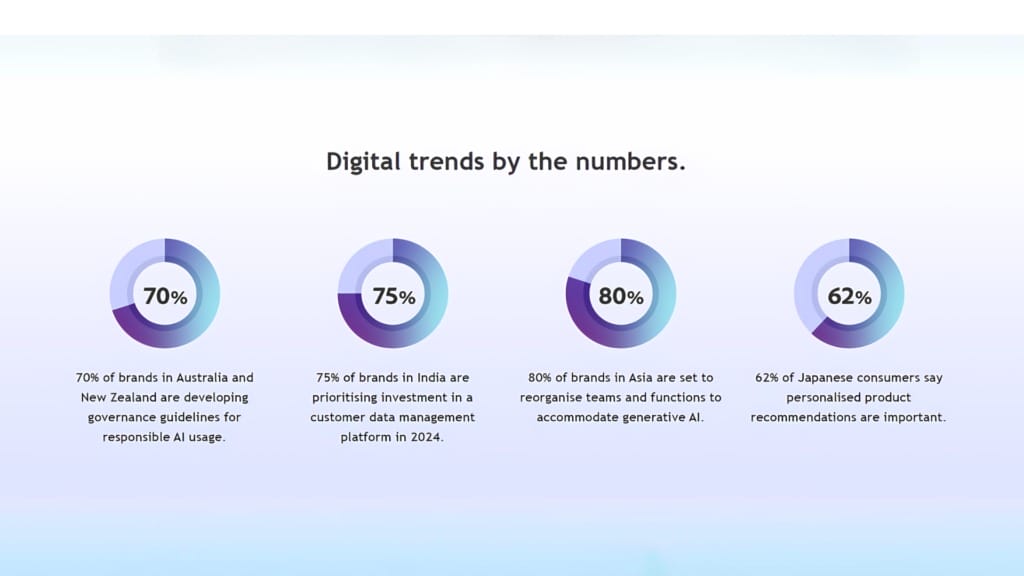Adobe: Transforming the digital landscape with insights from the APJ Digital Trends Report 2024
Discover how Adobe is leading digital transformation in the APAC region through Generative AI, personalisation, and customer experience, as highlighted in the APJ Digital Trends Report 2024.

Adobe has consistently led digital transformation, driving innovation and helping businesses navigate the complex and ever-evolving digital landscape. The APJ Digital Trends Report 2024 provides a wealth of insights into the current state and future direction of digital experiences, focusing on Generative AI (GenAI), personalisation, and digital customer experience. As these trends gain momentum, businesses in the Asia-Pacific region must understand how they can leverage these technologies to enhance their customer interactions and overall business outcomes.
Table Of Content
Key findings from the APJ Digital Trends Report 2024
The APJ Digital Trends Report 2024 reveals that the race for customer experience (CX) leadership is intensifying, with brands increasingly recognising the importance of digital tools and generative AI in winning consumer loyalty, conversion, and trust. Companies have unprecedented opportunities to unify their data, anticipate customer needs, and deliver more relevant, timely content and experiences. These capabilities are critical in positioning themselves as leaders in consumer loyalty and trust in a highly competitive marketplace.

The report shows that organisations in the Asia-Pacific region are focused on enhancing digital CX by adopting generative AI and advanced data strategies. These technologies are closely linked to the overall quality of digital CX, enabling businesses to deliver more personalised and engaging experiences to their customers. By harnessing the power of GenAI, companies can create tailored content and interactions that resonate more deeply with their audiences, driving higher engagement and satisfaction levels.
However, despite the region’s leadership in implementing generative AI solutions and pilot programmes, many brands must be fully prepared to deploy these technologies at scale. The report highlights that approximately half of the organisations surveyed need more upskilling, governance, and integrated processes to support AI adoption effectively. This gap underscores the need for a substantial cultural shift within organisations to successfully integrate AI into their operations.
The report also indicates that brands in the APJ region are leveraging generative AI to address the increasing demand for content velocity needed for personalisation at scale. While this technology is poised to revolutionise every part of the enterprise, organisations cannot afford to rest on their laurels. To fully realise the potential of GenAI, businesses must commit to scaling their AI initiatives, embedding these solutions deeply into their operations, and continuously innovating to stay ahead in the digital transformation journey.
GenAI: Revolutionising digital experiences
Generative AI is dramatically reshaping the landscape of digital customer experiences, bringing new levels of personalisation, efficiency, and interactivity across various touchpoints. One of the most significant advancements enabled by GenAI is the ability to deliver highly personalised digital customer experiences. By leveraging this emerging technology, businesses can provide customers with tailored offers, products, and content that closely align with their preferences and past behaviours. This level of personalisation creates a more engaging and relevant experience, which can significantly enhance customer satisfaction and loyalty.

Moreover, GenAI enables the creation of interactive and dynamic digital experiences, such as personalised email campaigns and customised user interfaces. These innovations keep customers engaged and invested in the brand, making every interaction more meaningful. As customers increasingly expect seamless and personalised experiences, the ability to deliver these through GenAI can be a crucial differentiator for businesses in the competitive digital landscape.
Another critical milestone achieved through GenAI is the transformation of content workflows and customer journey management. GenAI can automatically generate a wide range of content, from blog posts and social media updates to videos and graphics. This capability significantly reduces the time and cost associated with content production, allowing businesses to scale their content efforts without sacrificing quality. Additionally, by analysing customer data, GenAI can predict future behaviours and preferences, enabling businesses to stay ahead of the curve and tailor their offerings to meet evolving market demands.
GenAI is not just a tool for enhancing digital customer experiences but a catalyst for broader organisational transformation. By integrating GenAI into their operations, businesses can streamline processes, enhance personalisation, and create more dynamic and engaging customer interactions. As a result, GenAI is set to play an increasingly central role in the future of digital transformation, offering businesses the tools they need to stay competitive and responsive in an ever-changing market.
Personalisation at scale with Adobe
Personalisation has become a critical component of customer engagement, and businesses increasingly recognise its importance in creating meaningful connections with their audiences. Adobe has responded to this need by developing a comprehensive suite of solutions designed to help businesses achieve personalisation at scale. These solutions are tailored to enable organisations to deliver highly relevant and engaging experiences across all customer touchpoints, driving deeper connections and stronger loyalty.
One of the critical solutions Adobe offers is Adobe Experience Manager, a powerful tool that allows businesses to create and manage personalised content at scale. With its content fragments feature, organisations can develop reusable and flexible content pieces that can be easily repurposed across different channels and campaigns. This capability supports delivering dynamic, contextually relevant content, ensuring that customers receive the right message at the right time, no matter where they are in their journey.
In addition to Adobe Experience Manager, Adobe has harnessed the power of Generative AI through Adobe Sensei, a cutting-edge technology that complements Adobe Experience Cloud. Adobe Sensei enables brands to generate personalised content and copy, humanise conversational experiences, and create targeted audiences and journeys—all with exponential productivity. By automating and enhancing these processes, Adobe Sensei empowers businesses to deliver highly personalised experiences at scale, driving greater engagement and satisfaction.
Real-world examples of Adobe’s impact on personalisation can be seen in its work with local customers like M1 and the Central Provident Fund Board (CPFB) in Singapore. For M1, Adobe Experience Manager played a crucial role in helping the telecommunications provider enhance its hyper-personalisation strategies during the pandemic, ensuring that customer interactions remained seamless even as they shifted entirely to digital touchpoints. Similarly, CPFB leveraged Adobe’s solutions to develop personalised digital offerings such as the CPF retirement income planner, resulting in significant improvements in customer engagement, including a 10% increase in open rates for educational messages and nearly doubling the unique viewership of the Yearly Statement of Accounts.

By leveraging real-time data integration, scalable content management, and intelligent personalisation, Adobe empowers businesses to create seamless, connected customer experiences that are both engaging and effective. This holistic approach ensures that personalisation efforts are not just a one-off initiative but a continuous process that evolves with the customer’s needs and expectations, ultimately leading to stronger customer relationships and better business outcomes.
Enhancing digital customer experience
The Asia-Pacific region’s digital customer experience (CX) landscape is rapidly evolving, with organisations increasingly recognising personalisation’s critical role in enhancing customer interactions. In today’s digital age, where transactions occur instantly, and competitors are just a click away, delivering a first-class digital CX can help you decide between securing a sale and losing a customer. As a result, businesses are emphasising personalisation more as a critical strategy for differentiating themselves in the market.
Adobe research supports this trend, showing that moving from essential personalisation to one-on-one personalised interactions can significantly improve key performance metrics. For example, companies implementing advanced personalisation strategies can see up to a 10x improvement in conversion rates and a 9x increase in average order value. These findings highlight the substantial impact that personalised digital experiences can have on business performance, reinforcing the need for organisations to prioritise personalisation in their digital strategies.
As personalisation continues to be a key influencer in the digital CX landscape, brands must deliver relevant, timely experiences that build customer trust. This shift has led to a growing emphasis on customer data unification and developing an organisational culture that views data as a strategic asset. Organisations can create meaningful and impactful customer interactions by aligning their digital CX plans with business objectives and consumer priorities.
The underlying capabilities that enable organisations to deliver exceptional personalised digital CX also provide a strong foundation for adopting Generative AI. The demand for personalised content is driving the need for faster content production, and Generative AI is increasingly being used to address this challenge.
However, Adobe’s findings reveal a notable disparity between senior executives and practitioners regarding AI adoption readiness. While many organisations are equipped for generative AI deployment, only about half feel fully prepared. This gap underscores the need for a substantial cultural shift within organisations to adopt generative AI at scale and fully capitalise on its potential to transform digital CX.
Adobe’s business roadmap and regional plans
Adobe is committed to supporting businesses in the Asia-Pacific region as they navigate their digital transformation journeys. The company’s strong performance in recent quarters underscores the essential role that Adobe products play in driving the global digital economy. As businesses face new challenges and opportunities in the digital space, Adobe plans to provide enhanced support for organisations of all sizes, helping them build longer-term digital strategies that move beyond reactive measures and towards sustained growth and transformation.
One of Adobe’s key strategic initiatives is to remain relentlessly focused on identifying new growth opportunities while building on its strengths. By continually looking around the corner and anticipating future trends, Adobe aims to stay ahead of the competition and drive innovation within its existing business. This forward-thinking approach is critical to ensuring that Adobe remains a leader in the digital transformation space, providing businesses with the tools and solutions they need to succeed in an increasingly competitive market.
In addition to driving growth within its existing business, Adobe is committed to ensuring its products and services are developed ethically and with the user’s interests at heart. As countries in the Asia-Pacific region place increasing emphasis on AI governance and responsible innovation, Adobe is taking proactive steps to align its offerings with these priorities. This commitment to ethical development is a critical component of Adobe’s business roadmap, ensuring that the company’s solutions are practical and aligned with the broader values and goals of the communities it serves.

Simon Dale, Vice President of Asia at Adobe, highlights the importance of staying ahead of the curve in digital transformation. Adobe’s regional initiatives are designed to help businesses leverage the full potential of digital technologies for growth and innovation. By focusing on ethical development, strategic foresight, and continuous innovation, Adobe is well-positioned to lead the way in digital transformation across the Asia-Pacific region, providing businesses with the tools and support they need to thrive in the digital age.
Future of digital trends and technologies
Looking ahead, Generative AI and personalisation are expected to play increasingly significant roles in shaping the future of digital experiences. As these technologies evolve, Adobe is committed to integrating them into its solutions, ensuring businesses have access to the most advanced tools to stay competitive in a rapidly changing digital landscape. By staying at the forefront of these trends, Adobe aims to help businesses navigate the complexities of digital transformation and capitalise on these technologies’ opportunities.
Simon Dale emphasises the importance of focusing on innovation and ethical development as the company prepares to meet future demands. Adobe’s commitment to innovation is not just about developing new products and solutions but also about ensuring that these innovations are implemented in ways that align with society’s broader goals. This focus on ethical development is critical to Adobe’s long-term success and ability to continue leading the digital transformation.
As businesses in the Asia-Pacific region look to the future, they must consider how Generative AI and personalisation will impact their operations and customer interactions. By integrating these technologies into their digital strategies, organisations can create more dynamic, personalised, and engaging customer experiences that drive loyalty and growth. Adobe’s solutions are designed to support these efforts, providing businesses with the tools and insights they need to stay ahead of the curve.
















